广东省深圳市 Module 4 Unit 8 Collecting things 课件
文档属性
| 名称 | 广东省深圳市 Module 4 Unit 8 Collecting things 课件 | 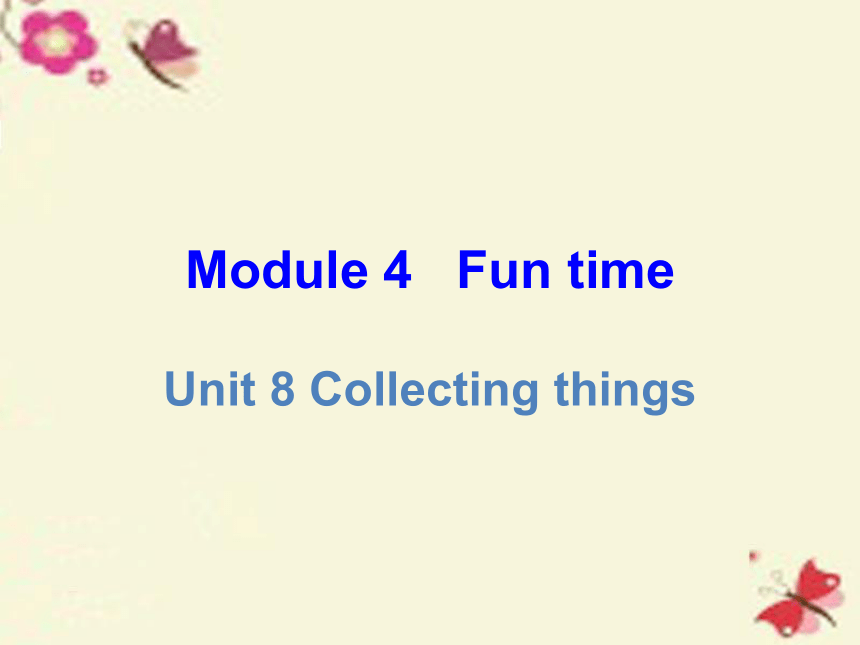 | |
| 格式 | zip | ||
| 文件大小 | 133.3KB | ||
| 资源类型 | 教案 | ||
| 版本资源 | 牛津深圳版 | ||
| 科目 | 英语 | ||
| 更新时间 | 2016-12-13 00:00:00 | ||
图片预览


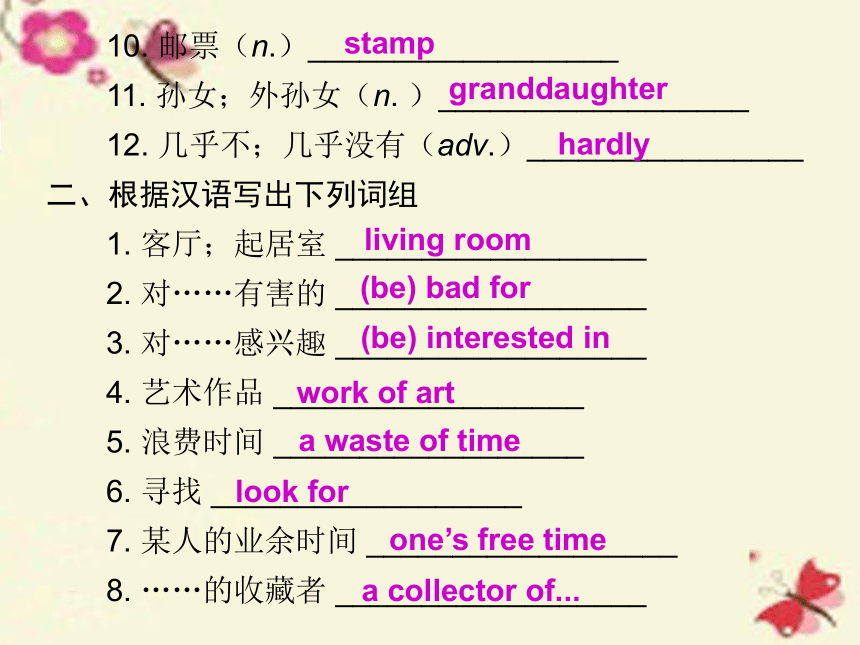
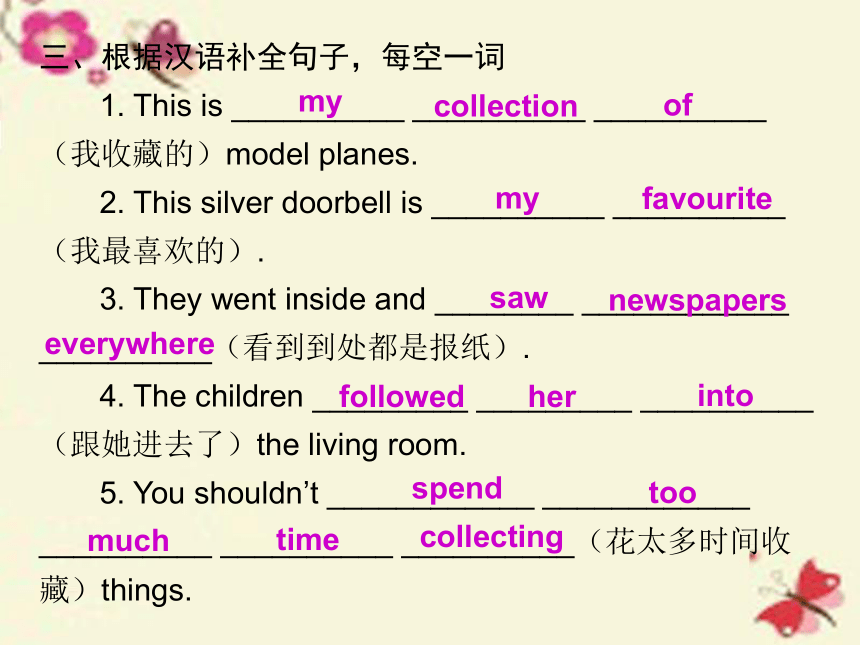
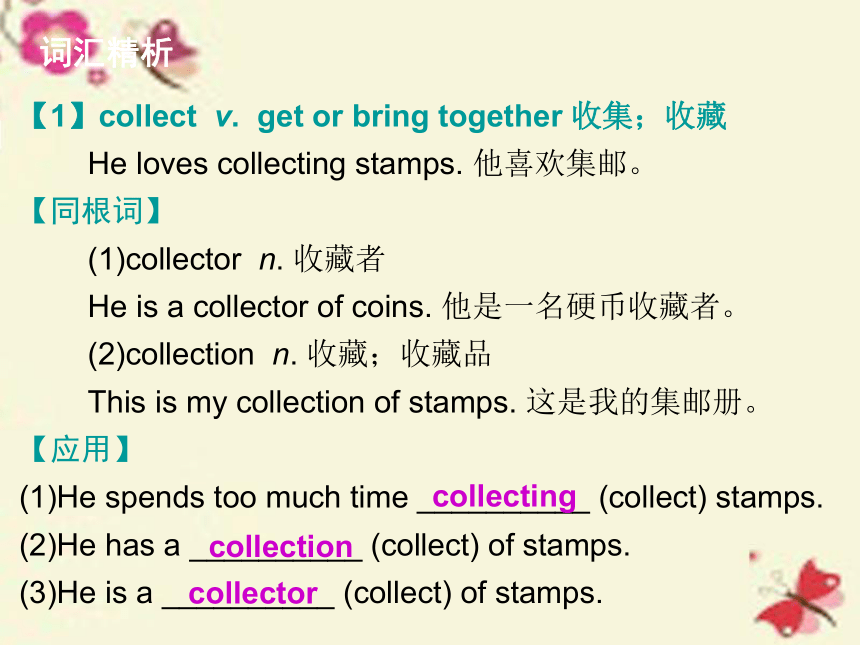
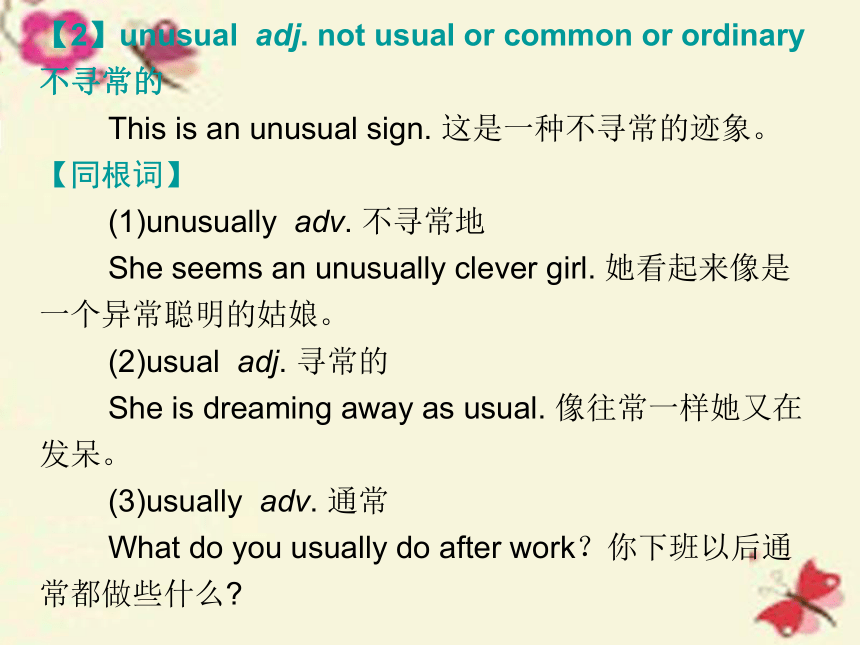
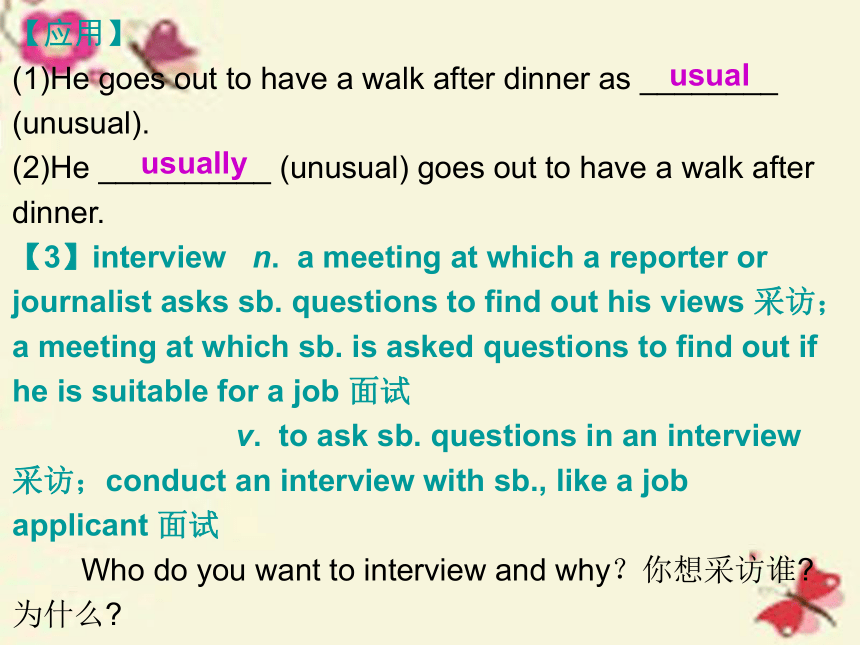
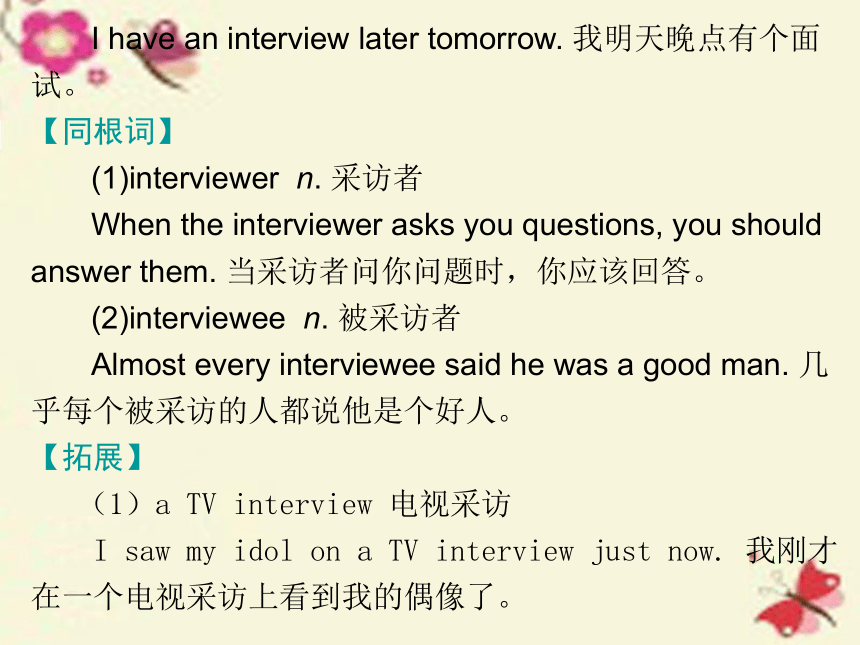
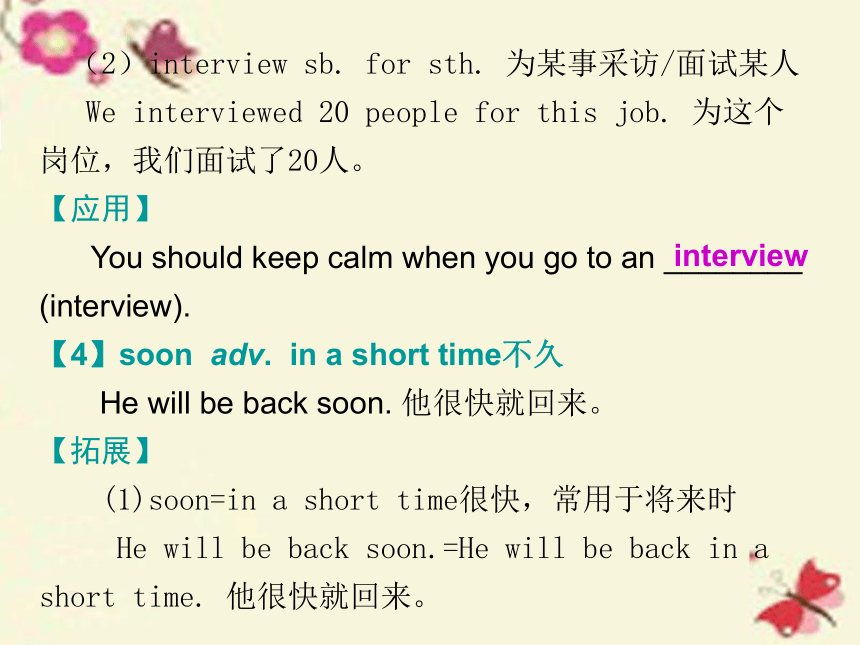
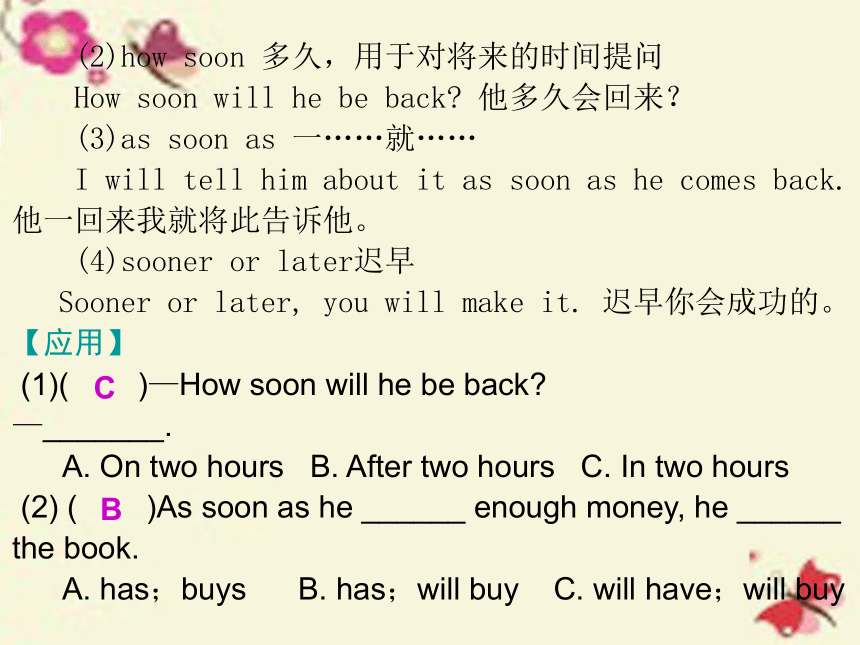
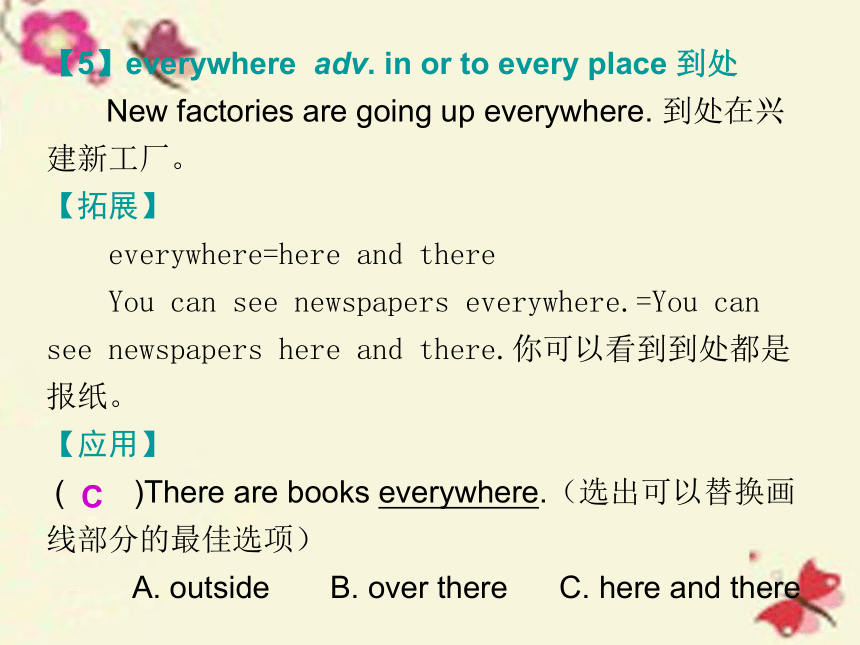
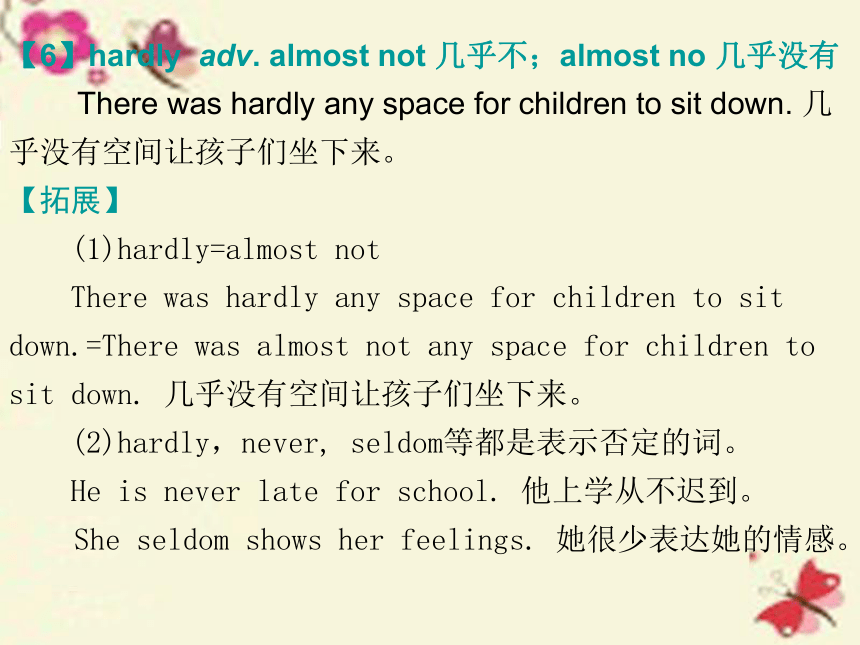
文档简介
课件30张PPT。Unit 8 Collecting thingsModule 4 Fun time自主预习一、根据汉语写出英文单词
1. 不寻常的 (adj.)__________________
2. 采访 (n.& v.)__________________
3. 按;揿;摁 (v.)__________________
4. 空闲的 (adj.)__________________
5. 银色的;银白色的 (adj.)__________________
6. 到处;每个地方 (adv.)__________________
7. 跟随 (v.)__________________
8. 杂志 (n.)__________________
9. 模型(n.)__________________ unusualinterviewpushfreesilvereverywherefollowmagazinemodel 10. 邮票(n.)__________________
11. 孙女;外孙女(n. )__________________
12. 几乎不;几乎没有(adv.)________________
二、根据汉语写出下列词组
1. 客厅;起居室 __________________
2. 对……有害的 __________________
3. 对……感兴趣 __________________
4. 艺术作品 __________________
5. 浪费时间 __________________
6. 寻找 __________________
7. 某人的业余时间 __________________
8. ……的收藏者 __________________stampgranddaughterhardlyliving room(be) bad for(be) interested inwork of arta waste of timelook forone’s free timea collector of...三、根据汉语补全句子,每空一词
1. This is __________ __________ __________(我收藏的)model planes.
2. This silver doorbell is __________ __________(我最喜欢的).
3. They went inside and ________ ____________ __________(看到到处都是报纸).
4. The children _________ _________ __________(跟她进去了)the living room.
5. You shouldn’t ____________ ____________ __________ __________ __________(花太多时间收藏)things.mycollectionofmyfavouritesawnewspaperseverywherefollowedherintospendtoomuchtimecollecting词汇精析【1】collect v. get or bring together 收集;收藏
He loves collecting stamps. 他喜欢集邮。
【同根词】
(1)collector n. 收藏者
He is a collector of coins. 他是一名硬币收藏者。
(2)collection n. 收藏;收藏品
This is my collection of stamps. 这是我的集邮册。
【应用】
(1)He spends too much time __________ (collect) stamps.
(2)He has a __________ (collect) of stamps.
(3)He is a __________ (collect) of stamps.collectingcollectioncollector【2】unusual adj. not usual or common or ordinary 不寻常的
This is an unusual sign. 这是一种不寻常的迹象。
【同根词】
(1)unusually adv. 不寻常地
She seems an unusually clever girl. 她看起来像是一个异常聪明的姑娘。
(2)usual adj. 寻常的
She is dreaming away as usual. 像往常一样她又在发呆。
(3)usually adv. 通常
What do you usually do after work?你下班以后通常都做些什么?【应用】
(1)He goes out to have a walk after dinner as ________ (unusual).
(2)He __________ (unusual) goes out to have a walk after dinner.
【3】interview n. a meeting at which a reporter or journalist asks sb. questions to find out his views 采访;a meeting at which sb. is asked questions to find out if he is suitable for a job 面试
v. to ask sb. questions in an interview 采访;conduct an interview with sb., like a job applicant 面试
Who do you want to interview and why?你想采访谁?为什么?usualusually I have an interview later tomorrow. 我明天晚点有个面试。
【同根词】
(1)interviewer n. 采访者
When the interviewer asks you questions, you should answer them. 当采访者问你问题时,你应该回答。
(2)interviewee n. 被采访者
Almost every interviewee said he was a good man. 几乎每个被采访的人都说他是个好人。
【拓展】
(1)a TV interview 电视采访
I saw my idol on a TV interview just now. 我刚才在一个电视采访上看到我的偶像了。 (2)interview sb. for sth. 为某事采访/面试某人
We interviewed 20 people for this job. 为这个岗位,我们面试了20人。
【应用】
You should keep calm when you go to an ________ (interview).
【4】soon adv. in a short time不久
He will be back soon. 他很快就回来。
【拓展】
(1)soon=in a short time很快,常用于将来时
He will be back soon.=He will be back in a short time. 他很快就回来。interview (2)how soon 多久,用于对将来的时间提问
How soon will he be back? 他多久会回来?
(3)as soon as 一……就……
I will tell him about it as soon as he comes back. 他一回来我就将此告诉他。
(4)sooner or later迟早
Sooner or later, you will make it. 迟早你会成功的。
【应用】
(1)( )—How soon will he be back?
—_______.
A. On two hours B. After two hours C. In two hours
(2) ( )As soon as he ______ enough money, he ______ the book.
A. has;buys B. has;will buy C. will have;will buyCB【5】everywhere adv. in or to every place 到处
New factories are going up everywhere. 到处在兴建新工厂。
【拓展】
everywhere=here and there
You can see newspapers everywhere.=You can see newspapers here and there.你可以看到到处都是报纸。
【应用】
( )There are books everywhere.(选出可以替换画 线部分的最佳选项)
A. outside B. over there C. here and thereC【6】hardly adv. almost not 几乎不;almost no 几乎没有
There was hardly any space for children to sit down. 几乎没有空间让孩子们坐下来。
【拓展】
(1)hardly=almost not
There was hardly any space for children to sit down.=There was almost not any space for children to sit down. 几乎没有空间让孩子们坐下来。
(2)hardly,never, seldom等都是表示否定的词。
He is never late for school. 他上学从不迟到。
She seldom shows her feelings. 她很少表达她的情感。【应用】
( )The boy hardly believed the news was true.(选出可以替换画线部分的最佳选项)
A. almost B. usually C. almost not
【7】free adj. not taken up by scheduled activities空闲的;costing nothing免费的;be able to act at will自由的
We have a lot of free time. 我们有很多空闲的时间。
【同根词】
(1)freedom n. 自由
Everyone loves freedom. 每个人都热爱自由。
(2)freely=without any obstruction adv. 自由地
The tourists went about London freely. 游客们在伦敦四处自由游览。C【拓展】
free=spare 空闲的
in one’s free time=in one’s spare time在某人的空余时间里
【应用】
(1)__________ (free) is important to everyone.
(2)( )Tom is free now. We can play basketball together.(选出可以替换画线部分的最佳选项)
A. not busy B. busy C. poorFreedomA【8】really adv. in reality, truly(强调观点等)确实,的确;to express interest, surprise, doubt, etc.
(用以表示兴趣、惊奇、怀疑等)真的
I really love the book because it’s so interesting. 我确实很喜欢这本书,因为它如此有趣。
【同根词】
(1)real adj. 真的;真实的;实际的
This is a real problem. 这是一个现实问题。
(2)reality n. 现实;真实性
If we work hard, our dream will become reality. 如果我们努力工作,梦想就会成真。【拓展】
really=truly 的确
They don’t really believe the story.=They don’t truly believe the story. 他们并不真的相信这个故事。
【应用】
(1)The story he told sounds __________ (really).
(2)The story he told sounds ____________ (really)
interesting.
【9】over adv. more, in addition 多于;end 结束
It’s an important task, so let’s get it over with as soon as possible. 这是一份重要的任务,所以让我们尽快地把它做完。realreally【拓展】
(1)over=more than多于
There are over 20 students here.=There are more than 20 students here. 这里有超过20名学生。
(2)be over=end结束
The class is over.=The class ends. 这节课结束了。
【应用】
(1)( )Tom is over thirteen. He is a middle school student now.(选出可以替换画线部分的最佳选项)
A. less than B. more than C. almost
(2)( )It’s 5 p.m. The last class is______.
A. end B. finish C. overBC【10】be bad for 对……有害的
My teacher told me smoking was bad for our health. 我的老师告诉我吸烟有害健康。
【拓展】
(1)be good for 对……有益的
Vegetables are good for our health. 蔬菜对我们的健康有益。
(2)be bad at 不擅长,其反义词组为:be good at 擅长
She is bad at Physics. 她不擅长物理课。
【应用】
( )Watching TV too much is bad ______ you eyes.
A. to B. for C. atB【11】be interested in 对……感兴趣
He is interested in playing football. 他对踢足球感兴趣。
【拓展】
be interested in=have an interest in=really like
He is interested in playing football.=He has an interest in playing football.=He really likes playing football. 他对踢足球感兴趣。
【应用】
(1)He is __________ (interest) in reading books.
(2)He has __________ (interest) in reading books.interestedinterest(3)( )Tom is interested in reading books.(选出可以替换画线部分的最佳选项)
A. is good at B. does well in C. really likes
【12】本单元主要句型归纳
(1)start doing sth.开始做某事
When did you start collecting phone cards? 你什么时候开始收集电话卡的呢?
(2)There is hardly any...for sb. to do sth.某人几乎没有……来做某事。
There is hardly any food for us to eat. 我们几乎没有能吃的食物了。
(3)doing sth.is+adj. 做某事是……的
Doing morning exercises is good for our health. 做早操对我们的身体健康有益。C语法梳理语法精讲 代词常用于代替名词以及承担名词作用的短语、不定式、动词的-ing形式、从句或句子。在英语中代词用得极为广泛。英语中的代词分为九类:人称代词、物主代词、反身代词、指示代词、相互代词、疑问代词、不定代词、关系代词和连接代词。在本单元,我们重点学习人称代词和物主代词。
一、人称代词
1.人称代词用来指代前面谈论到的名词,根据在句中的作用,可分为主格和宾格。 2.人称代词的主格一般在句中作主语。
I am a student. 我是一名学生。(I作主语)
You can do it yourself. 你可以自己去做。(you作主语)
They went to the park. 他们去了公园。(they作主语)
3.人称代词的宾格一般在句中作及物动词或介词的宾语。
My mother loves me very much. 我妈妈非常爱我。(me作宾语) My mother is friendly to them. 我妈妈对他们很友好。(them作宾语)
4.人称代词通常是“二、三、一” 的顺序。
You, he and I will have much work to do. 你、我、他将会有很多工作要做。
二、物主代词
1.物主代词可分为形容词性物主代词和名词性物主代词 2.形容词性物主代词一般作定语,后面接名词
This is my book. 这是我的书。 (my作定语)
What is your name?你的名字叫什么? (your作定语)
We can see her book on the desk. 我们可以看到她的书在桌子上。(her作定语)
3.名词性物主代词可作主语、表语、宾语等,后面不能接名词。
Yours is over there. 你的在那里。(yours作主语)
This book is mine. 这本书是我的。 (mine作表语)
My bike is broken. Can I borrow yours? 我的自行车坏了。我能借你的吗?(yours作宾语)直击中考( )1. —Is this ______ bike? (2014铜仁)
—No, it’s Lily’s. ______is over there.
A. your; My B. your;Mine
C yours; Mine D. yours;My
( )2. —Susan, go and join your sister in cleaning the yard. (2014黄冈)
—Why______? John is sitting there doing nothing at all.
A. I B. me C. myself D. mine
( )3. I have a big brother. ______name is Paul.
(2014北京)
A. His B. Her C. He D. YourBBA写作乐园话题八 我的收藏品
【常用词组】
1....years ago ……年前
2. at the age of... ……岁时
3. a large number of... 大量……
4. more than 超过
5. learn about 学习;了解
6. want to do sth. 想做某事
7. start doing 开始做
8. be from 来自
9. look for 寻找
10. each other 相互【精彩句型】
1. I like collecting... 我喜欢收藏……
2. I’m a collector of... 我是……的收藏者。
3. My first...is from... 我的第一个……是来自于……
4. This made me interested in... 这让我对……感兴趣。
5. It has a picture of...on it. 它上面有一张……的图片。
6. Collecting...makes me happy.收集……让我快乐。【短文写作】
很多人都有收藏东西的爱好。请你以“My collection”
为题写一篇短文,内容包括:
1. 你的收藏爱好是什么? 描述一下你的收藏品;
2. 你从何时开始有此爱好? 你的第一个收藏品是怎么得到的?
3. 你为何收藏这样的东西?
要求:条理清晰,语句通顺,意思连贯,不少于60词。
My collection
______________________________________________
______________________________________________
______________________________________________【范文赏析】
My collection
I like collecting stamps. It brings me a lot of fun. I started collecting stamps at the age of 8. My first stamp was from my father. He gave it to me as a new year present. The stamp has a picture of monkey on it. This made me interested in stamps. Soon I started to look for more stamps. Now I have more than 50 stamps. From the stamps, I learn a lot about Chinese culture. Collecting stamps is not only educational but also brings me friends. It makes me happy.谢谢欣赏!
1. 不寻常的 (adj.)__________________
2. 采访 (n.& v.)__________________
3. 按;揿;摁 (v.)__________________
4. 空闲的 (adj.)__________________
5. 银色的;银白色的 (adj.)__________________
6. 到处;每个地方 (adv.)__________________
7. 跟随 (v.)__________________
8. 杂志 (n.)__________________
9. 模型(n.)__________________ unusualinterviewpushfreesilvereverywherefollowmagazinemodel 10. 邮票(n.)__________________
11. 孙女;外孙女(n. )__________________
12. 几乎不;几乎没有(adv.)________________
二、根据汉语写出下列词组
1. 客厅;起居室 __________________
2. 对……有害的 __________________
3. 对……感兴趣 __________________
4. 艺术作品 __________________
5. 浪费时间 __________________
6. 寻找 __________________
7. 某人的业余时间 __________________
8. ……的收藏者 __________________stampgranddaughterhardlyliving room(be) bad for(be) interested inwork of arta waste of timelook forone’s free timea collector of...三、根据汉语补全句子,每空一词
1. This is __________ __________ __________(我收藏的)model planes.
2. This silver doorbell is __________ __________(我最喜欢的).
3. They went inside and ________ ____________ __________(看到到处都是报纸).
4. The children _________ _________ __________(跟她进去了)the living room.
5. You shouldn’t ____________ ____________ __________ __________ __________(花太多时间收藏)things.mycollectionofmyfavouritesawnewspaperseverywherefollowedherintospendtoomuchtimecollecting词汇精析【1】collect v. get or bring together 收集;收藏
He loves collecting stamps. 他喜欢集邮。
【同根词】
(1)collector n. 收藏者
He is a collector of coins. 他是一名硬币收藏者。
(2)collection n. 收藏;收藏品
This is my collection of stamps. 这是我的集邮册。
【应用】
(1)He spends too much time __________ (collect) stamps.
(2)He has a __________ (collect) of stamps.
(3)He is a __________ (collect) of stamps.collectingcollectioncollector【2】unusual adj. not usual or common or ordinary 不寻常的
This is an unusual sign. 这是一种不寻常的迹象。
【同根词】
(1)unusually adv. 不寻常地
She seems an unusually clever girl. 她看起来像是一个异常聪明的姑娘。
(2)usual adj. 寻常的
She is dreaming away as usual. 像往常一样她又在发呆。
(3)usually adv. 通常
What do you usually do after work?你下班以后通常都做些什么?【应用】
(1)He goes out to have a walk after dinner as ________ (unusual).
(2)He __________ (unusual) goes out to have a walk after dinner.
【3】interview n. a meeting at which a reporter or journalist asks sb. questions to find out his views 采访;a meeting at which sb. is asked questions to find out if he is suitable for a job 面试
v. to ask sb. questions in an interview 采访;conduct an interview with sb., like a job applicant 面试
Who do you want to interview and why?你想采访谁?为什么?usualusually I have an interview later tomorrow. 我明天晚点有个面试。
【同根词】
(1)interviewer n. 采访者
When the interviewer asks you questions, you should answer them. 当采访者问你问题时,你应该回答。
(2)interviewee n. 被采访者
Almost every interviewee said he was a good man. 几乎每个被采访的人都说他是个好人。
【拓展】
(1)a TV interview 电视采访
I saw my idol on a TV interview just now. 我刚才在一个电视采访上看到我的偶像了。 (2)interview sb. for sth. 为某事采访/面试某人
We interviewed 20 people for this job. 为这个岗位,我们面试了20人。
【应用】
You should keep calm when you go to an ________ (interview).
【4】soon adv. in a short time不久
He will be back soon. 他很快就回来。
【拓展】
(1)soon=in a short time很快,常用于将来时
He will be back soon.=He will be back in a short time. 他很快就回来。interview (2)how soon 多久,用于对将来的时间提问
How soon will he be back? 他多久会回来?
(3)as soon as 一……就……
I will tell him about it as soon as he comes back. 他一回来我就将此告诉他。
(4)sooner or later迟早
Sooner or later, you will make it. 迟早你会成功的。
【应用】
(1)( )—How soon will he be back?
—_______.
A. On two hours B. After two hours C. In two hours
(2) ( )As soon as he ______ enough money, he ______ the book.
A. has;buys B. has;will buy C. will have;will buyCB【5】everywhere adv. in or to every place 到处
New factories are going up everywhere. 到处在兴建新工厂。
【拓展】
everywhere=here and there
You can see newspapers everywhere.=You can see newspapers here and there.你可以看到到处都是报纸。
【应用】
( )There are books everywhere.(选出可以替换画 线部分的最佳选项)
A. outside B. over there C. here and thereC【6】hardly adv. almost not 几乎不;almost no 几乎没有
There was hardly any space for children to sit down. 几乎没有空间让孩子们坐下来。
【拓展】
(1)hardly=almost not
There was hardly any space for children to sit down.=There was almost not any space for children to sit down. 几乎没有空间让孩子们坐下来。
(2)hardly,never, seldom等都是表示否定的词。
He is never late for school. 他上学从不迟到。
She seldom shows her feelings. 她很少表达她的情感。【应用】
( )The boy hardly believed the news was true.(选出可以替换画线部分的最佳选项)
A. almost B. usually C. almost not
【7】free adj. not taken up by scheduled activities空闲的;costing nothing免费的;be able to act at will自由的
We have a lot of free time. 我们有很多空闲的时间。
【同根词】
(1)freedom n. 自由
Everyone loves freedom. 每个人都热爱自由。
(2)freely=without any obstruction adv. 自由地
The tourists went about London freely. 游客们在伦敦四处自由游览。C【拓展】
free=spare 空闲的
in one’s free time=in one’s spare time在某人的空余时间里
【应用】
(1)__________ (free) is important to everyone.
(2)( )Tom is free now. We can play basketball together.(选出可以替换画线部分的最佳选项)
A. not busy B. busy C. poorFreedomA【8】really adv. in reality, truly(强调观点等)确实,的确;to express interest, surprise, doubt, etc.
(用以表示兴趣、惊奇、怀疑等)真的
I really love the book because it’s so interesting. 我确实很喜欢这本书,因为它如此有趣。
【同根词】
(1)real adj. 真的;真实的;实际的
This is a real problem. 这是一个现实问题。
(2)reality n. 现实;真实性
If we work hard, our dream will become reality. 如果我们努力工作,梦想就会成真。【拓展】
really=truly 的确
They don’t really believe the story.=They don’t truly believe the story. 他们并不真的相信这个故事。
【应用】
(1)The story he told sounds __________ (really).
(2)The story he told sounds ____________ (really)
interesting.
【9】over adv. more, in addition 多于;end 结束
It’s an important task, so let’s get it over with as soon as possible. 这是一份重要的任务,所以让我们尽快地把它做完。realreally【拓展】
(1)over=more than多于
There are over 20 students here.=There are more than 20 students here. 这里有超过20名学生。
(2)be over=end结束
The class is over.=The class ends. 这节课结束了。
【应用】
(1)( )Tom is over thirteen. He is a middle school student now.(选出可以替换画线部分的最佳选项)
A. less than B. more than C. almost
(2)( )It’s 5 p.m. The last class is______.
A. end B. finish C. overBC【10】be bad for 对……有害的
My teacher told me smoking was bad for our health. 我的老师告诉我吸烟有害健康。
【拓展】
(1)be good for 对……有益的
Vegetables are good for our health. 蔬菜对我们的健康有益。
(2)be bad at 不擅长,其反义词组为:be good at 擅长
She is bad at Physics. 她不擅长物理课。
【应用】
( )Watching TV too much is bad ______ you eyes.
A. to B. for C. atB【11】be interested in 对……感兴趣
He is interested in playing football. 他对踢足球感兴趣。
【拓展】
be interested in=have an interest in=really like
He is interested in playing football.=He has an interest in playing football.=He really likes playing football. 他对踢足球感兴趣。
【应用】
(1)He is __________ (interest) in reading books.
(2)He has __________ (interest) in reading books.interestedinterest(3)( )Tom is interested in reading books.(选出可以替换画线部分的最佳选项)
A. is good at B. does well in C. really likes
【12】本单元主要句型归纳
(1)start doing sth.开始做某事
When did you start collecting phone cards? 你什么时候开始收集电话卡的呢?
(2)There is hardly any...for sb. to do sth.某人几乎没有……来做某事。
There is hardly any food for us to eat. 我们几乎没有能吃的食物了。
(3)doing sth.is+adj. 做某事是……的
Doing morning exercises is good for our health. 做早操对我们的身体健康有益。C语法梳理语法精讲 代词常用于代替名词以及承担名词作用的短语、不定式、动词的-ing形式、从句或句子。在英语中代词用得极为广泛。英语中的代词分为九类:人称代词、物主代词、反身代词、指示代词、相互代词、疑问代词、不定代词、关系代词和连接代词。在本单元,我们重点学习人称代词和物主代词。
一、人称代词
1.人称代词用来指代前面谈论到的名词,根据在句中的作用,可分为主格和宾格。 2.人称代词的主格一般在句中作主语。
I am a student. 我是一名学生。(I作主语)
You can do it yourself. 你可以自己去做。(you作主语)
They went to the park. 他们去了公园。(they作主语)
3.人称代词的宾格一般在句中作及物动词或介词的宾语。
My mother loves me very much. 我妈妈非常爱我。(me作宾语) My mother is friendly to them. 我妈妈对他们很友好。(them作宾语)
4.人称代词通常是“二、三、一” 的顺序。
You, he and I will have much work to do. 你、我、他将会有很多工作要做。
二、物主代词
1.物主代词可分为形容词性物主代词和名词性物主代词 2.形容词性物主代词一般作定语,后面接名词
This is my book. 这是我的书。 (my作定语)
What is your name?你的名字叫什么? (your作定语)
We can see her book on the desk. 我们可以看到她的书在桌子上。(her作定语)
3.名词性物主代词可作主语、表语、宾语等,后面不能接名词。
Yours is over there. 你的在那里。(yours作主语)
This book is mine. 这本书是我的。 (mine作表语)
My bike is broken. Can I borrow yours? 我的自行车坏了。我能借你的吗?(yours作宾语)直击中考( )1. —Is this ______ bike? (2014铜仁)
—No, it’s Lily’s. ______is over there.
A. your; My B. your;Mine
C yours; Mine D. yours;My
( )2. —Susan, go and join your sister in cleaning the yard. (2014黄冈)
—Why______? John is sitting there doing nothing at all.
A. I B. me C. myself D. mine
( )3. I have a big brother. ______name is Paul.
(2014北京)
A. His B. Her C. He D. YourBBA写作乐园话题八 我的收藏品
【常用词组】
1....years ago ……年前
2. at the age of... ……岁时
3. a large number of... 大量……
4. more than 超过
5. learn about 学习;了解
6. want to do sth. 想做某事
7. start doing 开始做
8. be from 来自
9. look for 寻找
10. each other 相互【精彩句型】
1. I like collecting... 我喜欢收藏……
2. I’m a collector of... 我是……的收藏者。
3. My first...is from... 我的第一个……是来自于……
4. This made me interested in... 这让我对……感兴趣。
5. It has a picture of...on it. 它上面有一张……的图片。
6. Collecting...makes me happy.收集……让我快乐。【短文写作】
很多人都有收藏东西的爱好。请你以“My collection”
为题写一篇短文,内容包括:
1. 你的收藏爱好是什么? 描述一下你的收藏品;
2. 你从何时开始有此爱好? 你的第一个收藏品是怎么得到的?
3. 你为何收藏这样的东西?
要求:条理清晰,语句通顺,意思连贯,不少于60词。
My collection
______________________________________________
______________________________________________
______________________________________________【范文赏析】
My collection
I like collecting stamps. It brings me a lot of fun. I started collecting stamps at the age of 8. My first stamp was from my father. He gave it to me as a new year present. The stamp has a picture of monkey on it. This made me interested in stamps. Soon I started to look for more stamps. Now I have more than 50 stamps. From the stamps, I learn a lot about Chinese culture. Collecting stamps is not only educational but also brings me friends. It makes me happy.谢谢欣赏!
